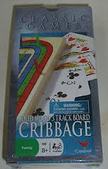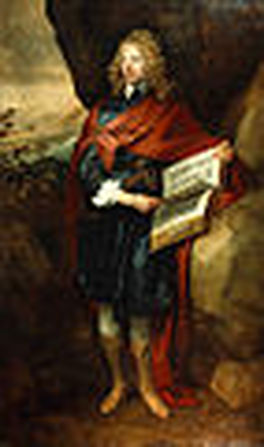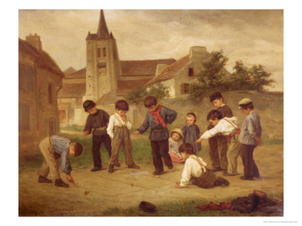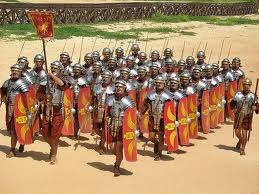 So my son recently received a cribbage game--a game I didn't know too much about but which looked fun enough. When we started to play, however, I happened to read this blurb on the packaging: "Cribbage is believed to have been invented during the 17th century by an English poet." What? Whoa! Cribbage is a 17th century game? Invented by a poet? What poet?! I had to look into this. So, of course, I typed in "History of Cribbage" into the almighty Google, and sure enough I found that "Cribbage was invented in the early 1600s by Sir John Suckling, an English courtier, poet, gamester and gambler." But since I tend not to believe what I read on the internet, I double-checked this information with the well-regarded Dictionary of National Biography. The DNB confirms the circumstantial evidence concerning the invention of the game, citing the biography of Suckling (1609-1641?), written by 17th century antiquarian John Aubrey (1626-1697) in his collection called Brief Lives.  Sir John Suckling -Courtier & Cribbage Creator Aubrey portrays Suckling as quite a merrymaker, anecdotally recalling him as "the greatest gallant of his time" (287). Suckling was, too, alleged to be the "greatest gamester, both for bowling and for cards." He had such a reputation for gambling, it would seem, that "no shopkeeper would trust him for 6d, as today he might by winning, be worth 200 pounds, and the next day he might not be worth half so much" (287-291). Surprisingly, Suckling wasn't actually very good at cards...a bit of a problem for a compulsive gambler. To make up for this deficit, he would "by himself abed, and there studyed how the best way of managing the cards could be." Indeed, he figured out a variation of an existing game--Noddy--which he called "cribbage." Apparently others liked cribbage as well, and he came to make a lot of money off of his reinvention. As Aubrey tells us: "Sir John Suckling invented the game of Cribbidge. He sent his Cards to all Gameing places in the countrey, which were marked with private markes of his; he gott twenty thousand pounds by this way." However, Suckling had a weakness for "Ladies of Quality, all beauties and young." This weakness ended up costing him "many hundreds of pounds," apparently because he enjoyed lavishing them with "silk stockings, garters and gloves." (Brief Lives, 289).
Fun guy, to be sure! Suckling, however, was more than a courtier and a ladies' man. He found time to write--quite prodigiously--and demonstrated some fine insights into the larger political context of the day. All told, he wrote seventy-eight poems, four plays, a few political tracts, as well as at least fifty letters, which according to Aubrey, displayed great intelligence and a "sparkling wit." (287-291) It's actually interesting to consider Suckling's personality when you reflect on the game. After all, cribbage offers a funny balance of strategy and luck, as well as a carefree leapfrog quality. Suckling's dual love of gambling and carousing at play? Just a thought. Eventually, his bad luck at gambling and in love seem to have caught up with him. Sadly, at age 28, when faced with great financial losses, Suckling poisoned himself, "which killed him miserably with vomiting" (291). A sad end...but at least he gave us cribbage. We think.
5 Comments
 Watching my five-year old play hopscotch the other day got me wondering--where did this simple game come from anyway? I mean, if you think about it, doesn't HOP SCOTCH sound like it's connected to beer and liquor? Maybe the game came from kids watching adults stumbling out of taverns, under the influence, trying to hop on one foot while picking up stuff they'd dropped, without toppling over. Maybe kids mimicked the grown ups and over time--voila!-- the game of hopscotch emerged. (Okay, I'm writing this entry on a Friday night after a LONG week, so I could be reaching.)  so these guys played hopscotch? Indeed, a quick internet search informed me that no, hopscotch has nothing to do with alcohol (darn it! I thought I was onto something there). Instead, a jillion sites claim that the game actually derived from an ancient Roman military training exercise. Roman soldiers, wearing full body armor, would hop through a hundred-yard field in a precise way, to help improve their footwork in battle. (Cool, hey? Shall I stop here?) Wel-l-l-l, I'm always a bit skeptical of what I read on the internet. Especially since many of these sites seemed to be just parroting the same tidbit over and over without any evidence. And there didn't seem to be any evidence of the term before the seventeenth century. And then I found this fascinating bit of detective work carried out by the "Rogue Classicist." Here, he essentially traced the origins of the hopscotch myth--and yes, it is a myth--to a misunderstanding. Apparently, in 1870 a scholar sharing his findings in an archeology journal made an offhand comment to the effect that some ancient tiles and disks might be 'admirably suited to our modern game of hopscotch.' But someone else misunderstood, and made an erroneous leap--reading a link from ancient times to modern game that was not there. This misunderstanding was picked up, and repeated so many times that eventually it became "fact". Oh, and what's the truth of it all? Hopscotch, originally called "scotch-hop", was a game which probably emerged in seventeenth-century England (although similar games can be found around the world.) First mentioned in the Book of Games in the 1670s, Francis Willughby describes the game of "hopscotchers" in which children play with a little piece of lead on a floor with lines etched--or "scotched"--onto its surface. So, a game. However, if you prefer, we can rewrite the history of hopscotch once again. Just cut and paste my imagined origins of the game--you know, where kids were laughing at drunk grown-ups--and pass it off as fact. What do you think? |
Susanna CalkinsHistorian. Mystery writer. Researcher. Teacher. Occasional blogger. Categories
All
Archives
May 2023
|
 RSS Feed
RSS Feed